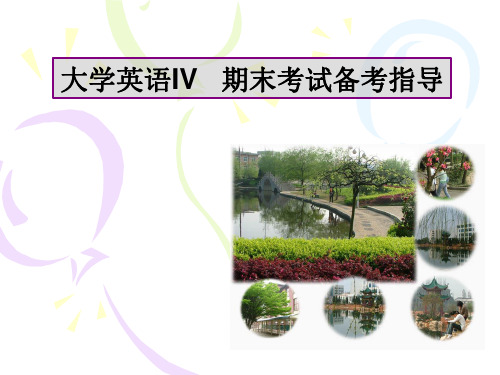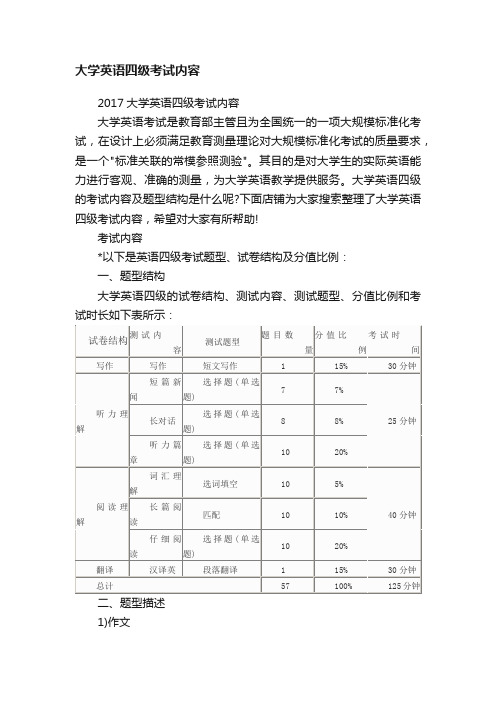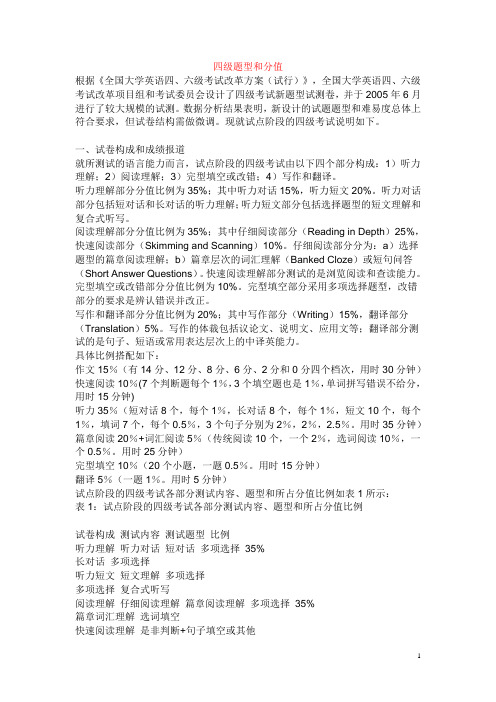11级普通班大学英语(四)期考题型、范围及出题安排
2011年12月英语四级试题及评分标准

2011年12月全国大学英语四级考试试题(CET4)Part ⅠWriting (30 minutes)注意:此部分试题在答题卡1上.For this part, you are allowed 30 minutes to write a short essay entitled Nothing Succeeds Without a Strong Will by commenting on the humorous saying, "Quitting smoking is the easiest thing in the world. I've done it hundreds of times." You should write at least 120 words but no more than 180 words.Outlines:1.坚强的意志是成功的重要保证2.意志坚定的人才能完成伟大的使命3.学生也是这样,不刻苦学习,终究不会成为有用之才Part ⅡReading Comprehension (Skimming and Scanning) (15 minutes)Why Integrity MattersWhat Is Integrity?The key to integrity is consistency- not only setting high personal standards for oneself (honesty, responsibility, respect for others, fairness) but also living up to those standards each and every day. One who has integrity is bound by and follows moral and ethical (道德上的) standards even when making life's hard choices, choices which may be clouded by stress, pressure to succeed, or temptation.What happens if we lie, cheat, steal, or violate other ethical standards? We feel disappointed in ourselves and ashamed. But a lapse (缺失) of integrity also affects our relationships with others. Trust is essential in any important relationship, whether personal or professional. Who can trust someone who is dishonest or unfair? Thus integrity must be one of our most important goals.Risky BusinessWe are each responsible for our own decisions, even if the decision, making process has been undermined by stress or peer pressure. The real test of character is whether we can learn from our mistake, by understanding why we acted as we did and then exploring ways to avoid similar problems in the future.Making ethical decisions is a critical part of avoiding future problems. We must learn to recognize risks, because if we can't see the risks we're taking, we can't make responsible choices. To identify risks, we need to know the rules and be aware of the facts. For example, one who doesn't know the rules a about plagiarism (剽窃) may accidentally use words or ideas without giving proper credit or one who fails to keep careful research notes may unintentionally fail to quote and cite sources as required. But the fact that such a violation is "unintentional" does not excuse the misconduct, Ignorance is not a defense."But Everybody Does It"Most people who get in trouble do know the rules and facts but manage to fool themselves about the risks they're taking by using excuses: "Everyone else does it." "I'm not hurting anyone", or "I really need this grade." Excuses can get very elaborate: "I know I'm look at another's exam, even though I'm supposed to keep my eyes on my own paper, but that's not cheating because I’m just checking my answers, not copying." We must be honest about our actions and avoid excuses, if we fool ourselves into believing we're not doing anything wrong, we can't see the real choice we're making - and that leads to bad decisions.To avoid fooling yourself, watch out for excuses and try this test: Ask how you would feel if your actions were public and anyone could be watching over your shoulder. If you'd rather hide your actions, that's an indication that you're taking a risk and rationalizing it to yourself.Evaluating RisksTo decide whether a risk is worth taking, you must examine the consequences, in the future as well as right now, negative as well as positive, and to others as well as to yourself. Those who take risks they later regret usually focus on immolate benefits and simply haven't considered what might go wrong. The consequences of getting caught are serious and may include a "O" on a test or assignment, an "F" in the class, suspension (暂令停学) or dismissal from school and a ruined reputation. In fact, when you break a role or law, you lose control over your life and give others the power to impose punishment that you have no control over. This is an extremely vulnerable (脆弱的) position. There may be some matters of life and death or highest principle, which might justify such a risk, but there aren't many things that fall in this category.Getting Away with it - Or NotThose who don't get caught pay an even higher price. A cheater doesn't learn from the test, which deprives (剥夺) him/her of an education. Cheating undermines confidence and independence: the cheater is a fraud, and knows that without dishonesty, he/she would have failed. Cheating destroys self-respect and integrity, leaving the cheater ashamed, guilty and afraid of getting caught.Worst of all, a cheater who doesn't get caught the first time usually cheats again, not only because he/she is farther behind, but also because it seems "easier." This slippery slope of eroding ethics and bigger risks leads only to disaster. Eventually, the cheater gets caught, and the later he/she gets caught, the worse the consequences. Cheating Hurts Other, TooCheaters often feel invisible, as if their actions "don't count" and don't really hurt anyone. But individual choices have an intense cumulative (累积的) effect. Cheating can spread like a disease. Recent statistics suggest 30%or more of college students cheat. If a class is graded on a curve, cheating hurts others' grades. Even if there is no curve, cheating "poisons" the classroom, and others may feel pressured to join in. ("If I don't cheat I can't compete with those who do") Cheating also has a destructive impact on teachers. The real reward of good teaching is seeing students learn. But a cheater says. "I'm not interested in what you're trying to teach, all I care about is stealing a grade, regardless of the effect on others." The end result is a destructive attack on the quality of your education. Finally, cheating can hurt the reputation of the university and harm those who worked hard for their degree.Why Integrity MattersIf cheating becomes the norm, then we are in big trouble. We must rely on the honesty and good faith of others, if not, we couldn't put money in the bank, buy food, clothing, or medicine from others, drive across a bridge, get on a plane, go to the dentist--the list is endless. There are many examples of the vast harm that is caused when individuals forget or ignore the effect their dishonesty can have. The savings and loan scandal, the stock market and junk bond swindles, and, of course, Watergate, have undermined the faith of many Americans in the integrity of political and economic leaders and society as a whole. Such incidents take a tremendous toll on our nation's economy and our individual well-being. For example, but for the savings and loan debacle, there might be funds available to reduce the national debt and pay for education.In sum, we all have a common stake in our school, our community, and our society. Our actions do matter. It is essential that we act with integrity in order to build the kind of world in which we want to live.1. A person of integrity not only sets high moral and ethical standards but also _______.A) sticks to them in their daily life B) makes them known to othersC) understands their true values D) sees that others also follow them2. What role does integrity play in personal and professional relationships?A) It helps to create team spirit B) It facilitates communicationC) It is the basis of mutual trust D) It inspires mutual respect3. why must we learn to identify the risks we are going to take?A. To ensure we make responsible choices.B. To avoid being overwhelmed by stress.C. so that we don’t break any rules.D. so that we don’t run into trouble.4. Violation of a rule is misconduct even if _______?A. it has caused no harm.B. it is claimed to be unintentional.C. it has gone unnoticed.D. it is committed with good intentions.5. What should one do if he doesn’t wish to fool himself?A. Avoid making excuses.B. Listen to other people’s advice.C. Make his intensions public.D. Have others watch over his shoulder.6. Those who take risks they regret later on _______.A. will often become more cautiousB. are usually very aggressiveC. value immediate benefits most.D. may lose everything in the end7. According to the author, a cheater who doesn’t get caught right away will _______.A) pay more dearly B) become more confidentC) be widely admired D) feel somewhat lucky8. Cheaters at exam don’t care about their education, all they care about is how to _____________________________.9. Integrity matters in that all social activities rely on people’s _________________________.10. Many Americans lost faith in the integrity of their political leaders as a result of ________________________________.Part III Listening Comprehension11.A)Read the notice on the window. C)Get a new bus schedule.B)Go and ask the staff D)Board the bus to Cleveland.12.A)He was looking forward to seeing the giraffes.B)He enjoyed watching the animal performance.C)He got home too late to see the TV special.D)He fell asleep in the middle of the TV program.13.A)she wants to take the most direct way. B)She may me late for the football game.C)She is worried about missing her flight. D)She is currently caught in a traffic jam.14.A)At a restaurant C)At a clinic. B)In a fish shop. D)On a fishing boat.15.A)He is an experienced sales manager. B)He is being interviewed for a job.C)He is a close friend of the woman. D)He is good at answering tricky questions.16.A)The man should consider his privacy first. B)The man will choose a low-rent apartment.C)The man is not certain if he can find a quieter place.D)The man is unlikely to move out of the dormitory.17.A)The woman is going to make her topic more focused.B)the man and woman are working on a joint project.C)One should be choose a broad topic for a research paper.D)It took a lot of time to get the man on the right track.18.A)They went camping this time last year. B)They didn’t quite enjoy their last picnic.C) They learned to cooperate under harsh conditions.D) They weren’t experienced in organizing picnics.19.A)He likes Sweden better than England. B)He prefers hot weather to cold weather.C)He is an English living in Sweden. D)He visits London nearly every winter.20.A)The bad weather B)The cold houses. C)The gloomy winter. D)The long night.21.A)Delightful. B)Painful. C)Depressing. D)Refreshing.22.A)They often stay up late reading. B)They work hard and play hard.C) They like to go camping in summer. D) They try to earn more and spend more.23. A)Management. B)French C)English literature D)Public Administration24.A)English teaching. B)Staff training. C)Careers guidance. D)Psychological counseling25.A)Its pleasant environment. B)Its worldwide fame.C)Its generous scholarship. D)Its well-designed courses.Section B Passage One26. A) Characteristics of Japanese artists B) Some features of Japanese cultureC) The art of Japanese brush painting D) The uniqueness of Japanese art27. A) To calm themselves down B) To enhance concentrationC) To show their impatience D) To signal their lack of interest28. A) How listeners in different cultures show respectB) How speakers can win approval from the audienceC) How speakers can misunderstand the audienceD) How different Western and Eastern art forms arePassage Two29. A) Directing personnel evaluation. B) Buying and maintain equipment.C) Drawing up plans for in-service training. D) Interviewing and recruiting employees.30. A) Some of his equipment was damaged in a fire. B) The training program he ran was failure.C) Two of his workers were injured at work. D) Two of his employees committed theft.31. A) A better relationship with his boss. B) Advancement to a higher positionC) A better-paying job in another company D) Improvement in the company’s management32 A)She has more self-confidence than Chris. B)She works with Chris in the same division.C)She has more management experience than Chris.D) She is competing with Chris for the new job.Passage Three33.A) They help us see the important values of a culture.B) They guide us in handling human relationships.C) They help us express ourselves more effectively.D) They are an infinite source of human knowledge.34. A)Their wordings may become different. B) The values they reflect may change.C)Their origins can no longer be traced. D) They may be misinterpreted occasionally.35. A) Certain values are shared by a large number of cultures.B) Some proverbs are assuming more and more importance.C) Old proverbs are constantly replaced by new ones.D) Certain values have always been central to a culture.Section COur lives are woven together. As much as I enjoy my own (36) _____________, I no longer imagine I can get through a (37) _____________ day, much less all my life, (38) _____________ on my own. Even if I am on (39) _____________ in the mountains, I am eating food someone else has grown, living in a house someone else has built, wearing clothes someone else has (40) _____________ from cloth woven by others, using (41) _____________ someone else is distributing to my house. (42) _____________ of interdependence is everywhere; we are on this (43) _____________ together.As I was growing up, (44) __________________________________________________ __________________________.“Make your own way”,” Stand on your own two feet” or my mother’s favorite remark when I was face-to-face with consequences of some action: Now that you’ve made your bed, lie on it!” Total independence is a dominant thing in our culture. I imagine that (45) ________________________________________________________________________________. But the teaching was shaped by our cultural imagines. And instead, I grew up believing that I was supposed to be totally independent and consequently became very reluctant to ask for help.(46) _________________________________________________________________PartⅣ Reading Comprehension (Reading in Depth) (25 minutes)Section AWith the world's population estimated to grow from six to nine billion by 2050, researchers. businesses and governments are already dealing with the impact this increase will have on everything from food and water to infrastructure (基础设施) and jobs. Underling all this 47 will be the demand for energy, which is expected to double over the next 40 years.Finding the resources to meet this demand in a 48 , sustainable way is the cornerstone (基石) of our nation's energy security, and will be one of the major 49 of the 21st century. Alternative forms of energy- bio-fuels, wind and solar, to name a few are 50 being funded and developed, and will play a growing 51 in the world's energy supply. But experts say that even when 52 , alternative energy sources will likely meet only about 30% of the world's energy needs by 2050.For example, even with 53 investments, such as the $93 million for wind energy development 54 in the American Recovery and Reinvestment Act, important alternative energy sources such as wind and bio-fuels 55 only about 1% of the market today.Energy and sustainability experts say the answer to our future energy needs will likely come from a lot of 56 both traditional and alternative.注意:此部分试题请在答题卡2上作答。
大学英语4(GE2002)期末考试题型和分值

3. To borrow such a book …was just impossible. 4. In those days the books which young people were
大学英语IV 期末考试备考指导
大学英语4(GE2002) 期末考试题型及分值分布:
Part I Listening (每题1分,共20分,短对话+长对话+1 passage) Part II Vocabulary (每题1分,共30分) Part III Reading Comprehension (2篇,每题2分,共20分) Part IV Para. Translation (共15分) Part V Writing (15分)
Unit 2 重点词汇
New Words
11. revolve 12. repetitive 13. envy 14. long to do 15. look upon/ on...as 16. part with 17. stumble upon 18. be honest with 19. on the side 20. nothing but
Unit 2 Talking books
New Words
1. struggle 2. confession 3. demoralize 4. prohibit 5. immorality 6. appetite 7. classification 8. recommendation 9. circulation 10. enrich
【VIP专享】大学英语(四)期末口语考试内容及形式

大学英语第二教学部11级11-12-2大学英语(四)期末考试(口语) 内容、题型、时间、形式和范围说明1. 考试的题型与考试所限定的时间:1)考试题型与形式与上学期与上学期基本一致;题型有小组讨论和个人词组造句和翻译共两部分;2)小组讨论部分为对评委给定的话题进行讨论;个人词组造句和翻译部分为4个词组造句和2句中译英翻译;3)小组讨论部分的考试时间为:三人组2分15秒;四人组3分钟;五人组3分45秒;4)个人词组造句和翻译部分的考试时间:4个词组造句和2句中译英翻译考试时间共为36秒;2. 考试的形式:1)下沙校区主要以四人小组为主,特殊情况下可以设三人小组或五人小组;2)本部校区主要以三人小组为主,特殊情况下可以设四人小组或五人小组;3)首先小组讨论考试,然后进行个人部分也就是词组造句和句子中译英翻译考试;3. 考试范围:1)个人词组造句与中译英翻译部分(Single Work)a. 词组造句中词组来自《新编大学英语》第四册Unit1—Unit6In-class Reading 及After-class Reading Passage I , Passage II 单词表中的Phrasesb. 翻译的句子(见附表一)2)小组讨论话题(topics for Group Work)(见附表二)4. 各班具体口语考试时间请看学院具体通知。
如有任何更改,请以学院通知为准。
注:若有临时更改,请以最新通知为准。
浙江工商大学11级11-12-2期末口语考试内容附表一:Translation1.活泼的举止对一个四岁孩子来说是正常的。
Lively behavior is normal for a four-year-old child.2.她总想成为注意的焦点。
She always wants to be the focus/center of attention3.如果我们提前买票是不是会便宜点儿?Is it cheaper if we buy our tickets in advance?4.速度快的车对我很有吸引力但我买不起。
大学英语四级考试内容

大学英语四级考试内容2017大学英语四级考试内容大学英语考试是教育部主管且为全国统一的一项大规模标准化考试,在设计上必须满足教育测量理论对大规模标准化考试的质量要求,是一个"标准关联的常模参照测验"。
其目的是对大学生的实际英语能力进行客观、准确的测量,为大学英语教学提供服务。
大学英语四级的考试内容及题型结构是什么呢?下面店铺为大家搜索整理了大学英语四级考试内容,希望对大家有所帮助!考试内容*以下是英语四级考试题型、试卷结构及分值比例:一、题型结构大学英语四级的试卷结构、测试内容、测试题型、分值比例和考试时长如下表所示:二、题型描述1)作文写作部分测试学生用英语进行书面表达的能力,所占分值比例为15%,考试时间30分钟。
写作测试选用考生所熟悉的题材,要求考生根据所提供的信息及提示(如:提纲、情景、图片或图表等)写出一篇短文,四级120-180词,六级150-200词。
2)听力为了适应新的形势下社会对大学生英语听力能力需求的变化,进一步提高听力测试的效度,全国大学英语四、六级考试委员会自2016年6月考试起将对四、六级考试的听力试题作局部调整。
调整的相关内容说明如下:①取消短对话②取消短文听写③新增短篇新闻(3段),其余测试内容不变。
[查看官方通知]3)阅读理解阅读理解部分包括1篇长篇阅读和3篇仔细阅读,测试学生在不同层面上的阅读理解能力,包括理解篇章或段落的主旨大意和重要细节、综合分析、推测判断以及根据上下文推测词义等能力。
该部分所占分值比例为35%,其中长篇阅读占10%,仔细阅读占25%。
考试时间40分钟。
长篇阅读部分采用1篇较长篇幅的文章,总长度四级约1000词,六级约1200词。
阅读速度四级约每分钟100词;六级约每分钟120词。
篇章后附有10个句子,每句一题。
每句所含的信息出自篇章的.某一段落,要求考生找出与每句所含信息相匹配的段落。
有的段落可能对应两题,有的段落可能不对应任何一题。
大学英语四级考试分题型讲解及技巧点拨精选全文

可编辑修改精选全文完整版大学英语四级考试分题型讲解及技巧点拨大学英语四级考试分题型讲解及技巧点拨[四六级]新大学英语四级分题型讲解及技巧点拨备受关注的大学英语改革后的四级考试新题型样卷终于在xx年10月份揭开神秘的面纱,这套由全国大学英语四、六级考试改革工程组和全国大学英语四、六级考试委员会编写的《大学英语四级考试(CET-4)试点考试样卷》已上海外语教育出版社出版发行,并收录了《全国大学英语四、六级考试改革方案(试行)》和最新大学英语四级考试(CET-4)试点考试样题。
另外,根据教育部高教司[xx]199号的通知,“为了使高校教师和学生更充分熟悉和了解新的考试要求和题型,积极稳步推进改革,对原定的试点考试时间等事宜做相应调整,原定于xx年12月进展的大学英语四级试点考试调整至xx年6月进展。
xx年12月仍按原方案全面实施新题型四级考试,时间不变”。
也就是说xx年6月的四级考试, 180所试点院校的局部学生将参加新题型试卷的考查,到了xx年12月份,不管是试点高校还是非试点高校,四级新题型将全面推广。
对于即将参加新题型考试的高校学子该如何准备新四级考试,才能取得高分?笔者经过仔细分析新题型样卷后,从实力和技巧两个方面提出复习备考策略。
听力的分值比例将由原来的20%提升到35%:短对话局部由原来的10题减至8题,共8分;增加了两篇长对话,出题模式类似于现行托福考试中听力Part B,每篇3至4题,共7题,分值比例7%,;段子题(passage)仍为3篇,共10题,每篇3到4题,分值比例10%;复合式听写中词汇听写由原来的.7个增加至8个,每空0.5分,听写仍保持3句不变,每句2分,复合式听写局部总共10分。
1、语音:*了解英美音的差异;例schedule,neither等*掌握根本的辨音根底,听到熟悉的音能在上下文中迅速确定对应的单词,提高听力的敏感性。
例:present,pleasant。
*注意连读问题,重点掌握固定词组之间的连读,根据连读规那么,尝试由慢到快脱口而出,提高对连读的听觉认知能力。
2011年12月英语四级考试题型及分值

四级题型和分值根据《全国大学英语四、六级考试改革方案(试行)》,全国大学英语四、六级考试改革项目组和考试委员会设计了四级考试新题型试测卷,并于2005年6月进行了较大规模的试测。
数据分析结果表明,新设计的试题题型和难易度总体上符合要求,但试卷结构需做微调。
现就试点阶段的四级考试说明如下。
一、试卷构成和成绩报道就所测试的语言能力而言,试点阶段的四级考试由以下四个部分构成:1)听力理解;2)阅读理解;3)完型填空或改错;4)写作和翻译。
听力理解部分分值比例为35%;其中听力对话15%,听力短文20%。
听力对话部分包括短对话和长对话的听力理解;听力短文部分包括选择题型的短文理解和复合式听写。
阅读理解部分分值比例为35%;其中仔细阅读部分(Reading in Depth)25%,快速阅读部分(Skimming and Scanning)10%。
仔细阅读部分分为:a)选择题型的篇章阅读理解;b)篇章层次的词汇理解(Banked Cloze)或短句问答(Short Answer Questions)。
快速阅读理解部分测试的是浏览阅读和查读能力。
完型填空或改错部分分值比例为10%。
完型填空部分采用多项选择题型,改错部分的要求是辨认错误并改正。
写作和翻译部分分值比例为20%;其中写作部分(Writing)15%,翻译部分(Translation)5%。
写作的体裁包括议论文、说明文、应用文等;翻译部分测试的是句子、短语或常用表达层次上的中译英能力。
具体比例搭配如下:作文15%(有14分、12分、8分、6分、2分和0分四个档次,用时30分钟)快速阅读10%(7个判断题每个1%,3个填空题也是1%,单词拼写错误不给分,用时15分钟)听力35%(短对话8个,每个1%,长对话8个,每个1%,短文10个,每个1%,填词7个,每个0.5%,3个句子分别为2%,2%,2.5%。
用时35分钟)篇章阅读20%+词汇阅读5%(传统阅读10个,一个2%,选词阅读10%,一个0.5%。
大学英语四级考试题型说明

1 听力部分:35% 2 阅读理解:35% 3 完形填空或改错:10% 4 写作和翻译:20%
• 听力部分:35% (1) 听力对话15%:短对话和长对话 (2) 听力短文20%:
选择题型的短文和复合式听写;
• 阅读理解:35%
• 1 仔细阅读(Reading in Depth)25% A. 选择题型的篇章阅读理解 B. 篇章层次的词汇理解(Banked Cloze)
短文写作 汉译英
比例
35%
35% 10% 20%
• ______________ (只要你不断尝试),you will be able to resolve the difficult problem sooner or later.
• In his composition there were ___________ (除了少许拼写错误以外没有其他错误)。
• 翻译 (Translation):5% 测试的是句子、短语或常用表达层次的中译 汉能力。
CET-4试卷结构与时间分配
结构 试题内容
答题时间 答题卡
Part I Writing Part II Reading Comprehension
(Skimming and Scanning) Part III Listening Comprehension
• You’d better take a sweater with you _____(以防天气变冷)。
• Through the project, many people have received training and __________(决定自 己创业)。
• The anti-virus agent was not known _______(直到一名医生偶然发现了它)。
大学英语四级考试(CET-4)题型

大学英语四级考试(CET-4)题型Part I Writing (30 minutes)Part II Reading Comprehension (Skimming and Scanning) (15 minutes) Part III Listening Comprehension (35 minutes)Section A Conversations(8 short and 2 long conversations)Section B Passages (3)Section C Compound DictationsPart IV Reading Comprehension (Reading in Depth) (25 minutes) Section A A passage with ten blanks, choices made from a listSection B 2 passages (1-from-4 multiple choice)Part V Cloze (15 minutes)One passage with 20 blanksPart VI Translation (5 minutes)Translate into English the Chinese given in brackets.大学英语四级考试流程9:00~9:10发答题纸一、答题纸二和试题册,考生正确填写个人信息。
9:10~9:55做答题纸一上的作文和快速阅读。
9:55~10:00收答题纸一。
10:00~11:20做答题纸二上的听力、深度阅读、完形填空和翻译。
(注意:10:00~10:35做听力)。
11:20收答题纸二及试题册,考试结束。
听力及阅读的标准分换算法标准分=得分*10*0.35答对得分标准分35 71 248.534 68 23833 65 227.532 63 220.531 61 213.530 59 206.529 57 199.528 55 192.527 53 185.526 51 178.525 50 17524 49 171.523 48 16822 47 164.521 46 16120 45 157.5综合测试的标准分换算法标准分=得分*10*0.15答对得分标准分15 71 106.514 67 100.513 63 94.512 60 9011 57 85.510 54 819 51 76.58 48 727 45 67.56 42 635 39 58.54 37 55.53 35 52.52 33 49.51 31 46.50 29 43.5Cloze:每2题算一个,共10个翻译:每题算1个,共5个新四级考试新题型应对全攻略体制改革后,又进行了考试内容的改革,涉及到四级考试题型的变化,考试程序的改动,各题型分数比重的变动等。
- 1、下载文档前请自行甄别文档内容的完整性,平台不提供额外的编辑、内容补充、找答案等附加服务。
- 2、"仅部分预览"的文档,不可在线预览部分如存在完整性等问题,可反馈申请退款(可完整预览的文档不适用该条件!)。
- 3、如文档侵犯您的权益,请联系客服反馈,我们会尽快为您处理(人工客服工作时间:9:00-18:30)。
2011级普通班大学英语(四)期末考试题型、范围及出题安排
一、普通班的题型及范围:
Ⅰ作文(15分)1篇,与四级题型类似。
选自课外材料。
Ⅱ快速阅读(10分)1篇,共10题,每题1分。
选自《新视界大学英语快速阅读4》每个单元中的timed reading 1。
Ⅲ听力(25分)
Section A
短对话8篇,共8题,每题1分。
选自历年四级真题2012年6月、2011年12月、2011年6月、2010年12月。
Section B
长对话2篇及短文2篇,共12题,每题1分。
其中长对话每篇4题,短文每篇2题。
1篇长对话选自历年四级真题2012年6月、2011年12月、2011年6月、2010年12月,1篇选自课外材料。
2篇短文选自《应用型大学英语视听说教程4》Units 3, 4, 7, 8中的Part Ⅱ中的Section Two的ItemⅠ和ItemⅡ。
Section C
复合式听写1篇,共5题,每题1分。
每空只需填一个单词。
选自《应用型大学英语视听说教程4》Units 3, 4, 7, 8中Part Ⅱ的Section Two的Item 1和Item 2。
听力填空出题方式为:打印出1篇音频文章,挖掉5个单词,音频播放3遍,学生根据听到的内容填上8个单词。
Ⅳ短语连线(5分)共5题,每题1分。
选自《应用型大学英语综合教程4》Units 3, 4, 7, 8中Part 1 Text后的短语表。
出题方式为:已列出中英文词组各一栏,要求学生根据意思来配对。
Ⅴ选词填空(5分)1篇,共10题,每题0.5分。
选自《应用型大学英语综合教程4》Units 3, 4, 7, 8中的Part 1 Text的第1—5段。
出题方式为:选一到三段内容,挖掉10个单词,再补充5个单词,共为15个备选单词,要求学生把那10个单词填回段落中。
Ⅵ仔细阅读(20分)2篇,共10题,每题2分。
1篇文章选自历年四级真题2012年6月、2011年12月、2011年6月、2010年12月。
另1篇文章选自课外材料。
Ⅶ完形填空(10分)1篇,共20题,每题0.5分。
选自课外材料。
Ⅷ中译英(10分),共10题,每题1分。
选自《应用型大学英语综合教程4》Units 3, 4, 7, 8中Part 1 练习7 Translation的B部分翻译练习。
中译英,题目已给出部分英文,要求把括弧里的中文翻译成英文。
1。
